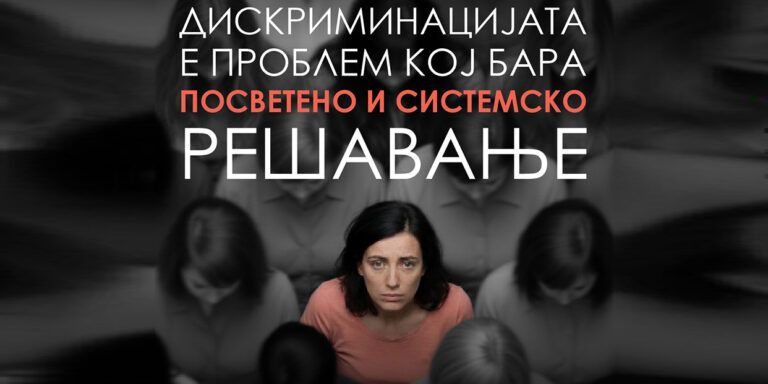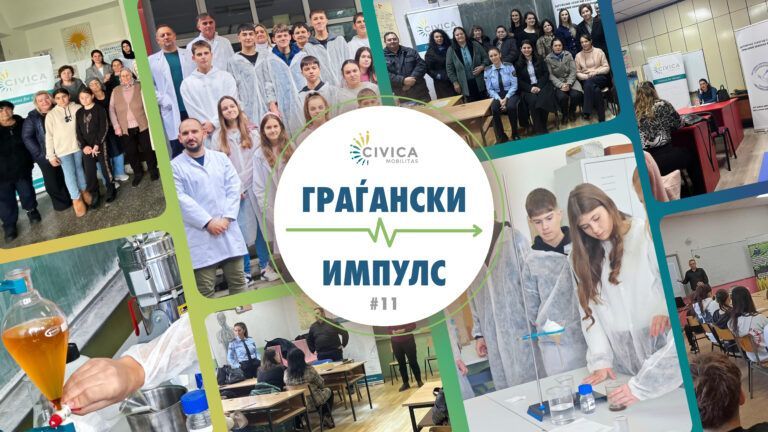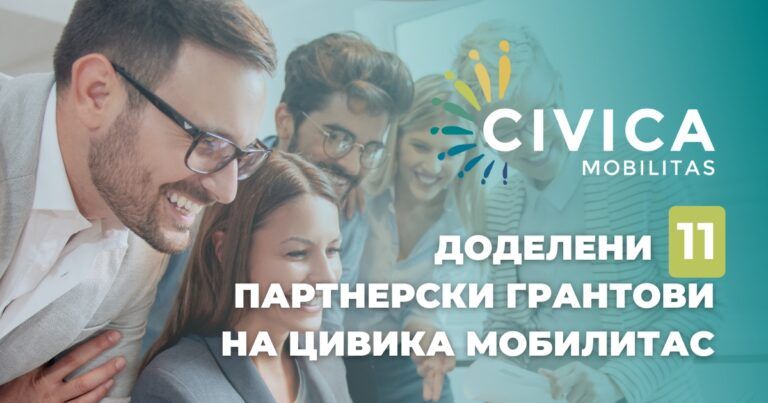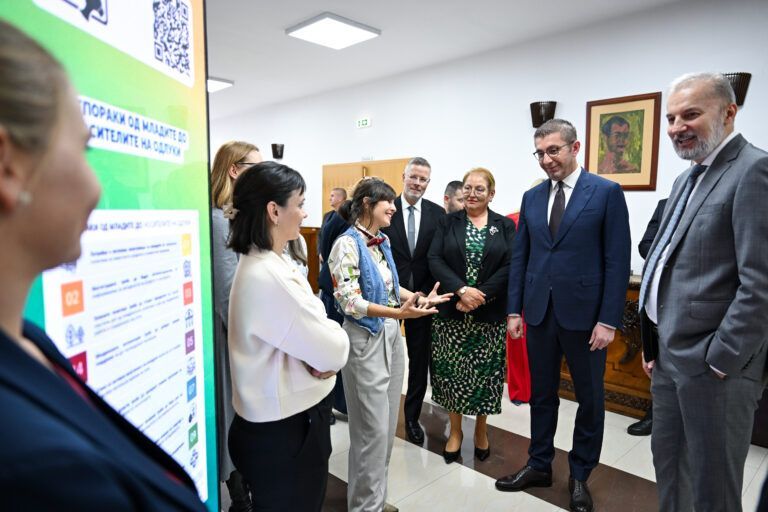Are the migration positive effects possible?
Migrations were the main topic of the tenth regional forum of Civica Mobilitas which covered the Vardar and Northeastern region, held on 14 July 2016 in Sveti Nikole. A total number of 69 representatives of civil society organizations, municipalities, citizens, and other interested parties were part of this almost a whole-day event.

At the panel “Migrations – truth and challenge”, Dr. Zlatko Nikolovski, Dr. Liljana Colakova-Dervishova, Kiril Makarovski, Strahil Todorov and Neal Raimi talked, and it was facilitated by Ubavka Janevska. Nikolovski, who has a PhD in migrations and diaspora issues and a President of “New Contact”, talked about the global situation, the reasons for migrations, and their impact on the peace and security, but also the economic and social situation in the world and Macedonia. “There is a need for cooperation with the business sector to follow the students while studying, a state scholarship program for talented students, a network of scientists to use their potential”, these are some of the proposals made by Nikolovski in order to improve the situation.
Dr. Liljana Colakova-Dervishova, President of the Association of Private Doctors in the Republic of Macedonia, talked about the emigration of health care workers and the effects on the health care system, especially on the health of people. Three years ago, the Association of Private Doctors appealed to the authorities about the drain of staff and about the possible negative impact of doctors’ emigration. The lack of doctors in the municipalities is one of the results of the emigration. Dr. Colakova talked about the difficulties that private doctors have before opening their own practice, especially in rural area, as well as the measures that the state should undertake in order to improve the health care system and the conditions for work and development of doctors.
Kiril Markovski from Municipality of Sveti Nikole talked about the benefits of the construction of the highway from Skopje via Sveti Nikole to Stip, and the fast road Veles-Stip, but also about the situation of emigration from Sveti Nikole. “Each investor is driven by an economic interest. There are repatriates who have invested, but they haven’t received the expected result and they have left again. But, through analyses, the situation and measures could be shown to the Government, and I hope it will accept them and this process of youth emigration will be reduced”.

To the question asked by Janeva if he planned to leave Macedonia, Strahil Todorov, a graduated doctor, answered affirmatively. The reasons, according to him, are numerous, starting from the fact that “you have to be a political party member or a child from doctor’s family” in order to get employment in a public health care institution, then the unfavorable environment for specialization, but also further professional development. There is no minimum salary being identified, and in regard to the specialization, he stressed that none of the options, state or private, was favorable for the young doctors, especially for the female doctors, and here he mentioned both the duration and costs of the specialization, lack of insurance, lack of possibility for the private residents to be members of trade unions, limitation of the maternity leaves during the specialization, etc.
Neal Raimi from Center for Intercultural Dialogue from Kumanovo, talked about the opportunities out of Macedonia, but also how the experience acquired abroad could be used in Macedonia. She informed about the activities of CID-Kumanovo for enabling young people for employment, but also about the need for the volunteering experience to be taken into consideration as a working experience in the process of employment. Some of the participants were parents of children who want to leave or have left, or young people who have faced the challenge of leaving their country. The emotions overwhelmed some of them and showed the need for provision of space for such discussions and a joint action to reduce the emigration. Milos Dimitrovski from Izvor- Kratovo shared the findings of the research on emigration in the Northeastern region, conducted within the small action grant from Civica Mobilitas.
The forum continued with an interactive workshop, conducted by Ines Feterlej from CID-Kumanovo, during which the participants were challenged to give opinion about certain view in regard to the reasons and consequences for migrations, for example “party affiliation does not influence employment”, or about the quality of education and the like.
In the final part of the forum, the Center for Roma Community “Drom” presented the findings of the research on the perceptions and understandings of the high school students and vulnerable groups about the modern forms of trafficking in human beings in Kumanovo and Gostivar, while Florence Nightingale presented the findings of the research on domestic violence perceptions, focusing on domestic violence on women in the municipality of Kumanovo, both conducted within the grants from Civica Mobilitas. The Foundation for Local Development and Democracy “Focus” – Veles and Women’s Organization of the Municipality of Sveti Nikole presented the achievements of their action.
Within the forum, the Creative Women from Veles, Lozovo and Sveti Nikole also presented themselves through an exhibition of hand-made objects, jewelry, and pieces of clothing, as well as some of the organizations presented their promotional materials.
The forum ended with an informal gathering, exchange of ideas, but also with the performance of the magician and illusionist Ivan Nacev, who performed an hour program for the children from Sveti Nikole. The regional forum was organized in cooperation of the Civica Mobilitas project office and the Women’s Organization of the Municipality of Sveti Nikole, Foundation for Local Development and Democracy “Focus” – Veles, Center for Intercultural Dialogue – Kumanovo, Center for Roma Community “Drom”, and Multi-ethnic Association Florence Nightingale – Kumanovo, all grantees of Civica Mobilitas.


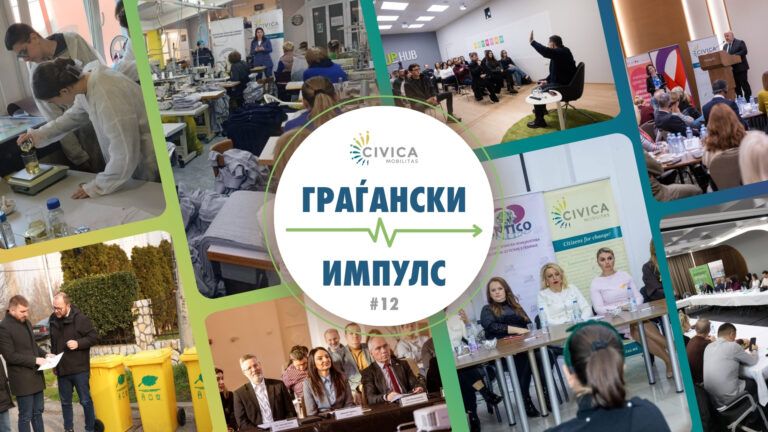
![Sre]ni praznici(2)](https://civicamobilitas.mk/wp-content/uploads/2025/12/sreni-praznici2-768x432.jpg)
